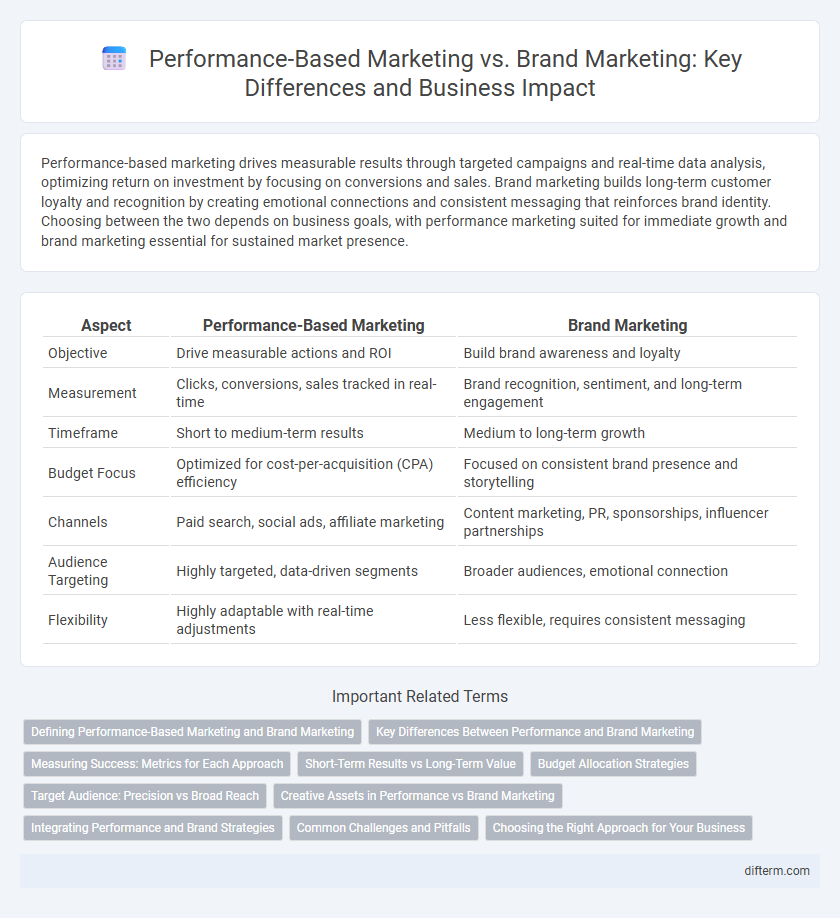Performance-based marketing drives measurable results through targeted campaigns and real-time data analysis, optimizing return on investment by focusing on conversions and sales. Brand marketing builds long-term customer loyalty and recognition by creating emotional connections and consistent messaging that reinforces brand identity. Choosing between the two depends on business goals, with performance marketing suited for immediate growth and brand marketing essential for sustained market presence.
Table of Comparison
| Aspect | Performance-Based Marketing | Brand Marketing |
|---|---|---|
| Objective | Drive measurable actions and ROI | Build brand awareness and loyalty |
| Measurement | Clicks, conversions, sales tracked in real-time | Brand recognition, sentiment, and long-term engagement |
| Timeframe | Short to medium-term results | Medium to long-term growth |
| Budget Focus | Optimized for cost-per-acquisition (CPA) efficiency | Focused on consistent brand presence and storytelling |
| Channels | Paid search, social ads, affiliate marketing | Content marketing, PR, sponsorships, influencer partnerships |
| Audience Targeting | Highly targeted, data-driven segments | Broader audiences, emotional connection |
| Flexibility | Highly adaptable with real-time adjustments | Less flexible, requires consistent messaging |
Defining Performance-Based Marketing and Brand Marketing
Performance-based marketing focuses on measurable, data-driven results such as clicks, leads, or sales, optimizing campaigns based on specific key performance indicators (KPIs). Brand marketing aims to build long-term brand awareness, loyalty, and perception through consistent messaging and emotional connection with the target audience. While performance marketing delivers immediate ROI metrics, brand marketing invests in sustained brand equity and market positioning over time.
Key Differences Between Performance and Brand Marketing
Performance-based marketing focuses on measurable metrics such as click-through rates, conversions, and ROI, optimizing campaigns for immediate results and direct customer action. Brand marketing emphasizes long-term brand awareness, loyalty, and perception, prioritizing emotional connection and brand equity over immediate sales. The key difference lies in performance marketing's data-driven approach targeting short-term gains versus brand marketing's strategic focus on sustained brand growth and market positioning.
Measuring Success: Metrics for Each Approach
Performance-based marketing relies heavily on measurable metrics such as cost per acquisition (CPA), return on ad spend (ROAS), and conversion rates to directly link campaigns to revenue generation. Brand marketing emphasizes metrics like brand awareness, brand recall, and customer sentiment analysis to gauge long-term customer loyalty and market positioning. Combining these approaches allows businesses to balance immediate revenue tracking with sustained brand equity growth.
Short-Term Results vs Long-Term Value
Performance-based marketing delivers measurable short-term results by focusing on immediate actions such as clicks, conversions, and sales, making it ideal for campaigns with clear ROI targets. Brand marketing prioritizes long-term value by cultivating customer trust, loyalty, and recognition, which supports sustained growth and market presence over time. Combining both strategies enables businesses to balance quick revenue generation with durable brand equity development.
Budget Allocation Strategies
Performance-based marketing allocates budgets based on measurable ROI metrics like cost per acquisition and conversion rates, ensuring funds are directed toward campaigns that drive immediate sales. Brand marketing budgets prioritize long-term equity building through channels such as TV, sponsorships, and content marketing, focusing on awareness and customer loyalty. Balancing spend between these strategies involves analyzing lifetime customer value and sales funnel impact to optimize overall marketing effectiveness.
Target Audience: Precision vs Broad Reach
Performance-based marketing targets specific audiences through data-driven strategies, ensuring precise ad spend and measurable ROI by focusing on user behavior and conversion metrics. Brand marketing aims for broad reach to build awareness and loyalty over time, appealing to a wider demographic through emotional connection and storytelling. Choosing between the two depends on whether the goal is immediate sales with targeted precision or long-term brand equity across diverse market segments.
Creative Assets in Performance vs Brand Marketing
Creative assets in performance-based marketing are designed for immediate engagement and conversion, utilizing data-driven insights to optimize visuals and messaging for specific target actions. In brand marketing, creative assets focus on long-term emotional connection and brand identity consistency, emphasizing storytelling and aesthetic cohesion to build brand equity over time. Performance marketing creatives prioritize agility and testing, while brand marketing assets invest in enduring narratives and visual symbols that resonate across broader audiences.
Integrating Performance and Brand Strategies
Integrating performance-based marketing with brand marketing maximizes ROI by aligning short-term conversions with long-term brand equity. Utilizing data-driven analytics in performance campaigns enhances targeting precision, while consistent brand messaging fosters customer loyalty and trust. This strategic blend ensures sustainable business growth by capturing immediate results and building a resilient market presence.
Common Challenges and Pitfalls
Performance-based marketing often struggles with accurately attributing conversions, leading to challenges in measuring true ROI and optimizing campaigns effectively. Brand marketing faces difficulties in quantifying brand equity and long-term customer loyalty, making it hard to justify immediate budget allocation. Both strategies risk misalignment between marketing goals and metrics, resulting in inefficient spend and suboptimal business outcomes.
Choosing the Right Approach for Your Business
Performance-based marketing drives measurable results through targeted campaigns and direct ROI tracking, ideal for businesses seeking immediate sales growth. Brand marketing emphasizes building long-term customer loyalty and brand equity by creating emotional connections and sustained visibility. Selecting the right approach depends on your business goals, budget, and timeline, balancing short-term performance with long-term brand strength.
performance-based marketing vs brand marketing Infographic

 difterm.com
difterm.com